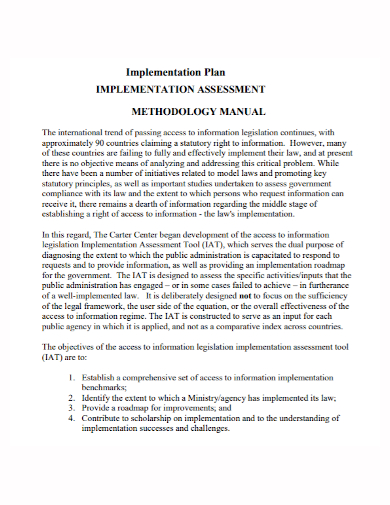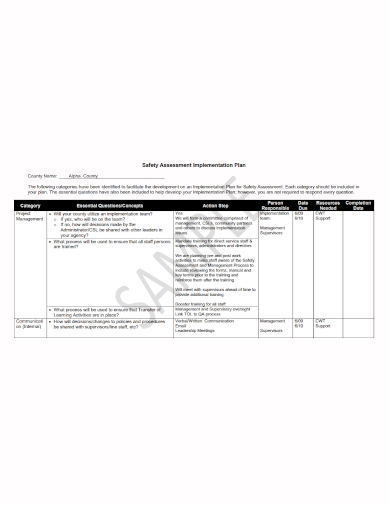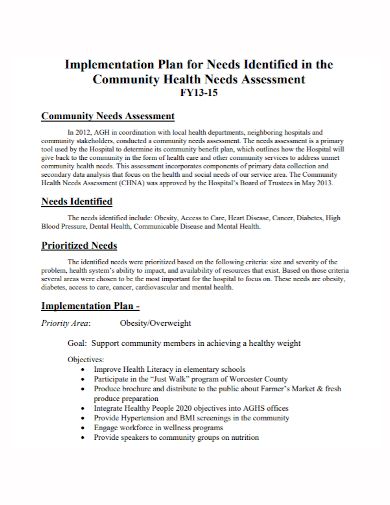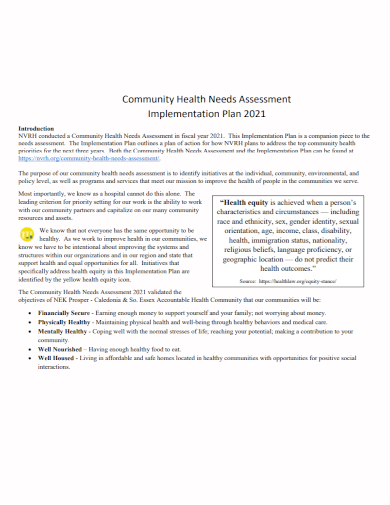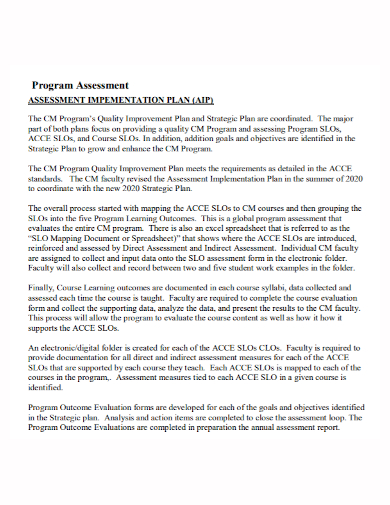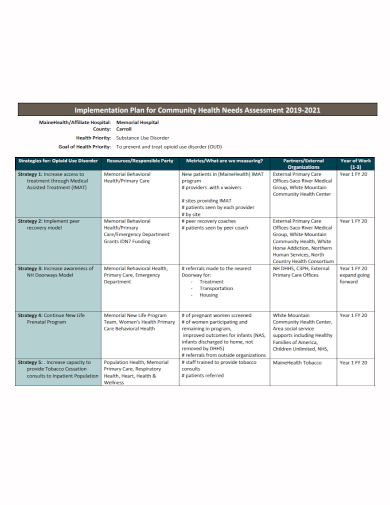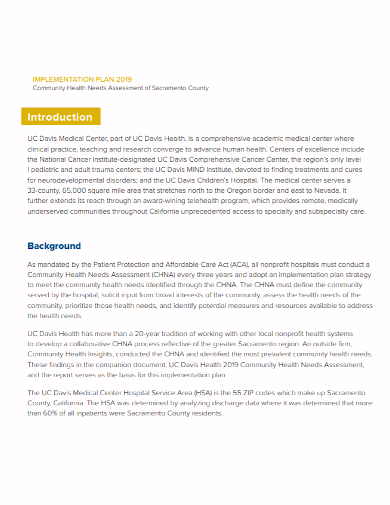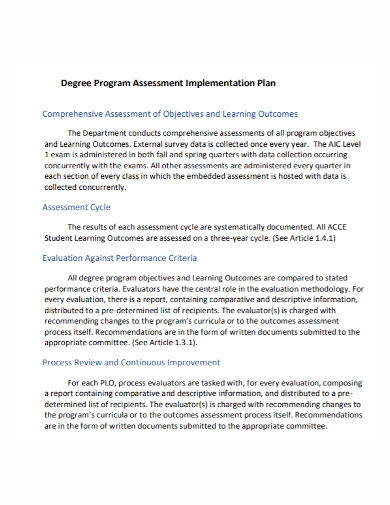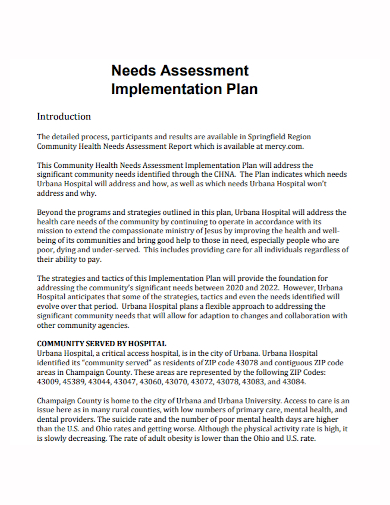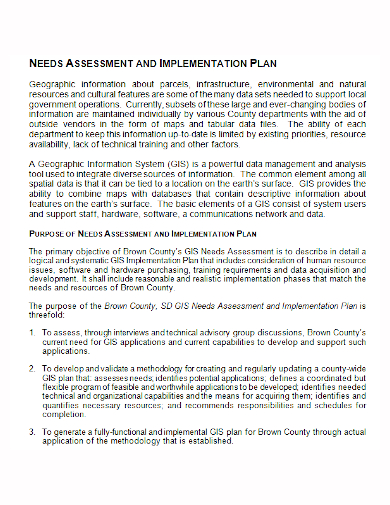The implementation assessment focuses on an agency’s, company’s or institution’s ability and capacity to prepare all the necessary needs in providing information and responding to requests. These are sets of questions that would quantitatively measure the efficacy and effectiveness of an organization or individuals. Assessments will be made through desk research, interviews, and review of key documents. In schools, universities and other institutions, Implementation Plan is kind of Review Program that would highlight the institution’s performance in responding it’s stakeholder’s inquiries and concerns. The implementation plan includes, but is not limited to, an action plan to achieve program maintenance outcomes and program learning outcomes.
In making your Assessment Implementation Plan, Sample Templates gives you available, competent and utilizable templates that could be of great assistance as you make this project. You just need to browse through this article to check the available templates below and choose the template of your choice.
We also offer you assessment templates like Project Planning Risk Assessment, Program Assessment Plan, Quality Assessment Plan, Assessment Action Plan, Risk Assessment Plan, Vulnerability Assessment Plan, School Assessment Plan, Project Assessment Plan, Parenting Assessment Plan and any in our store just for your needs.
10+ Assessment Implementation Plan Samples
1. Assessment Implementation Plan Template
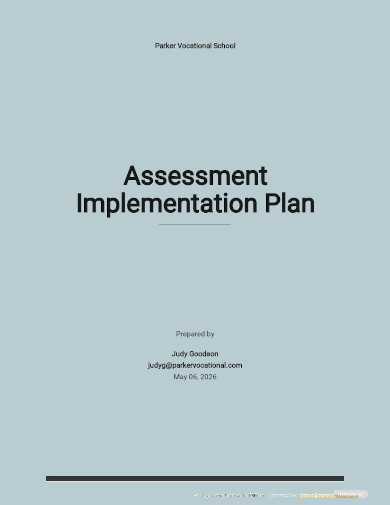
2. Assessment Implementation Plan
3. Safety Assessment Implementation Plan
4. Community Assessment Implementation Plan
5. Health Needs Assessment Implementation Plan
6. Program Assessment Implementation Plan
7. Community Needs Assessment Implementation Plan
8. Community Health Assessment Implementation Plan
9. Degree Program Assessment Implementation Plan
10. Sample Assessment Implementation Plan
11. Standard Assessment Implementation Plan
Assessment In The Academic World
The goal of assessment, whether for an academic department or a program, is to provide: (a) a clear conceptualization of intended student learning outcomes, (b) a description of how these outcomes are assessed and measured, (c) a description of the results obtained from these measures, and (d) a description of how these results validate current practices or point to changes needed to improve student learning. Below are the steps of the Cycles of Assessment that you need to know about:
Step 1: Identify the Learning Outcomes
Each program should formulate between 3 and 5 learning outcomes that describe what students should be able to do (abilities), to know (knowledge), and appreciate (values and attitudes) following completion of the program.
Step 2: Select Appropriate Assessment Measures
Multiple ways of assessing the learning outcomes are usually selected and used. Although direct and indirect measures of learning can be used, it is usually recommended to focus on direct measures of learning. Levels of student performance for each outcome is often described and assessed with the use of rubrics.
Step 3: Analyze The Results Of The Outcome
It is important to analyze and report the results of the assessments in a meaningful way. Analysis of the results of the outcome will let you identify whether the goal has been achieved or not.
Step 4: Improve Or Adjust Programs According To Results
Assessment results are worthless if they are not used. This step is a critical step of the assessment process. The assessment process has failed if the results do not lead to adjustments or improvements in programs. The results of assessments should be disseminated widely to faculty in the department in order to seek their input on how to improve programs from the assessment results.
FAQs
What is Assessment Implementation Cycle?
The Cycle of Assessment. Good assessment follows an intentional and reflective process of design, implementation, evaluation, and revision. The Cycle of Assessment relies on four simple but dynamic words to represent this process: Teach, Measure, Reflect, and Plan & Improve.
What is continuous assessment?
Continuous assessment is a formative process. It enables teachers to assess learner’s progress before the end of his course. Teachers can use continuous assessment information to modify work. Learners use continuous assessment results to improve their performance.
What are the types of assessment?
Diagnostic assessments.
Formative assessments.
Summative assessments.
Ipsative assessments.
Norm-referenced assessments.
Criterion-referenced assessments.
Assessment is a very important aspect that should be highly monitored and be well thought of in the academic world. This would serve as a measurement or testing whether the program, degree or curriculum is effective or need to be improved. The results shall also be taken seriously and should be considered in making modifications. Utilizing the templates that are available in this article is a first step in making your assessment implementation plan, successful.
Related Posts
FREE 9+ 30-Day Marketing Plan Samples in PDF | MS Word | Apple Pages | Google Docs
FREE 3+ Sales Team Action Plan Samples in PDF | MS Word | Apple Pages | Google Docs
Marketing Plan For Small Business Samples
FREE 7+ Fashion Business Plan Samples in PDF
FREE 10+ Sprint Planning Samples In MS Word | Google Docs | PDF
FREE 10+ Wedding Planning Samples in MS Word | Apple Pages | Powerpoint | PDF
FREE 9+ Monthly Study Planner Samples in PSD | Illustrator | InDesign | PDF
FREE 9+ Sample Curriculum Planning Templates in PDF | MS Word
FREE 10+ Teacher Development Plan Samples in MS Word | Google Docs | Apple Pages | PDF
FREE 10+ Basketball Practice Plan Samples in PDF
FREE 12+ School Business Plan Samples in PDF | MS Word | Apple Pages | Google Docs
FREE 7+ Client Strategic Plan Samples in PDF | MS Word
FREE 11+ Trucking Business Plan Templates in PDF | MS Word | Google Docs | Pages
FREE 7+ Small Hotel Business Plan Samples PDF | MS Word | Apple Pages | Google Docs
FREE 14+ Bakery Business Plans in MS Word | PDF | Google Docs | Pages

